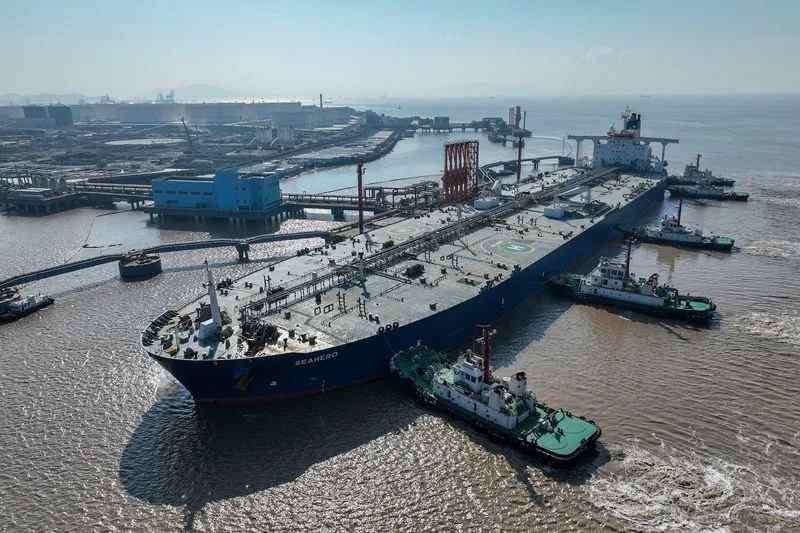Oil falls on doubts OPEC+ will make further cuts

Oil prices fell on Monday on concern about a drop in demand and on continued uncertainty about the depth and duration of OPEC+ supply cuts.
Brent crude futures settled down 85 cents, or 1.08%, at $78.03 a barrel. U.S. West Texas Intermediate crude futures finished down $1.03, or 1.39%, at $73.04.
Monday's fall adds to a 2% decline last week after the supply cuts announced on Thursday by the Organization of the Petroleum Exporting Countries (OPEC) and allies including Russia, together known as OPEC+.
"The market has decided (OPEC+ production plans) are not going to have that much of an impact. It's more style over substance," said Andrew Lipow, president of Lipow Oil Associates, said about crude traders on Monday. Saudi Arabia's energy minister Prince Abdulaziz bin Salman said in a televised interview with Bloomberg on Monday that he expected OPEC and its allies to bring about the 2.2 million in crude oil production cuts announced last week.
"I honestly believe that the delivery of the 2.2 will happen," Bin Salman said. "I honestly believe that will continue to happen (and the) 2 million will overcome even the huge inventory build that usually happens in the first quarter."
OPEC+ last week announced production cuts that are voluntary in nature, raising doubts about whether or not producers would fully implement them. Investors were also unsure about how the cuts would be measured.
Traders over the past five months have waited to see if cuts in production as well as predicted changes in demand would come to fruition, said Zane Curry, vice president of markets and research for Mobius Risk Group.
"We've become Missouri, the Show-Me state," Curry said.
Surveys on Friday showed global manufacturing activity remained weak in November on soft demand, with euro zone factory activity contracting, while there were mixed signs on the strength of China's economy.
"The OPEC+ 'deal' last week was unconvincing to say the least," said Craig Erlam, analyst at brokerage OANDA. "And with markets seemingly anticipating more of an economic slowdown next year, the announcement simply doesn't go far enough."
Elsewhere, Western countries have stepped up efforts to enforce the $60 a barrel price cap on seaborne shipments of Russian oil imposed to punish Moscow for its war in Ukraine.
Washington on Friday imposed additional sanctions on three entities and three oil tankers.
Brent crude futures settled down 85 cents, or 1.08%, at $78.03 a barrel. U.S. West Texas Intermediate crude futures finished down $1.03, or 1.39%, at $73.04.
Monday's fall adds to a 2% decline last week after the supply cuts announced on Thursday by the Organization of the Petroleum Exporting Countries (OPEC) and allies including Russia, together known as OPEC+.
"The market has decided (OPEC+ production plans) are not going to have that much of an impact. It's more style over substance," said Andrew Lipow, president of Lipow Oil Associates, said about crude traders on Monday. Saudi Arabia's energy minister Prince Abdulaziz bin Salman said in a televised interview with Bloomberg on Monday that he expected OPEC and its allies to bring about the 2.2 million in crude oil production cuts announced last week.
"I honestly believe that the delivery of the 2.2 will happen," Bin Salman said. "I honestly believe that will continue to happen (and the) 2 million will overcome even the huge inventory build that usually happens in the first quarter."
OPEC+ last week announced production cuts that are voluntary in nature, raising doubts about whether or not producers would fully implement them. Investors were also unsure about how the cuts would be measured.
Traders over the past five months have waited to see if cuts in production as well as predicted changes in demand would come to fruition, said Zane Curry, vice president of markets and research for Mobius Risk Group.
"We've become Missouri, the Show-Me state," Curry said.
Surveys on Friday showed global manufacturing activity remained weak in November on soft demand, with euro zone factory activity contracting, while there were mixed signs on the strength of China's economy.
"The OPEC+ 'deal' last week was unconvincing to say the least," said Craig Erlam, analyst at brokerage OANDA. "And with markets seemingly anticipating more of an economic slowdown next year, the announcement simply doesn't go far enough."
Elsewhere, Western countries have stepped up efforts to enforce the $60 a barrel price cap on seaborne shipments of Russian oil imposed to punish Moscow for its war in Ukraine.
Washington on Friday imposed additional sanctions on three entities and three oil tankers.
Source: https://www.yahoo.com
Previous Story
- Oil prices dive on big US crude stock...
- Oil prices fall on worries of waning demand...
- Oil prices flat as investors assess risks of...
- Saudi Arabia says it will maintain production cuts...
- Oil prices climb as risk appetite grows, focus...
- Oil jumps to 2023 highs amid low tank...
- Inflation expected to tick higher in August as...
- Rupee weakens for third straight day as higher...